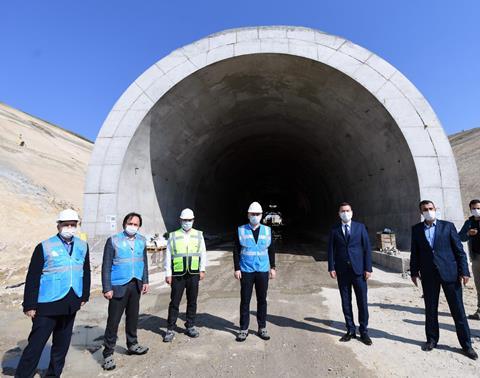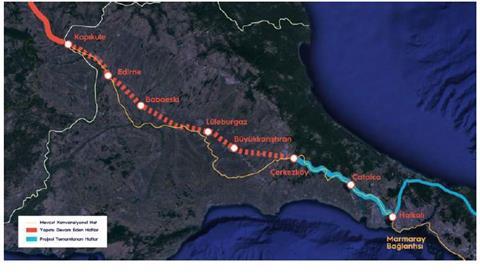
TURKEY: The European Bank for Reconstruction & Development is to provide Turkey with a €150m loan for reconstruction of the 67 km long Ispartakule – Çerkezköy section of the 233 km main line linking Halkalı on the western edge of Istanbul with Kapıkule on the border with Bulgaria.
Reporting that the Asian Investment Bank is considering offering a parallel loan that would partially offset more of the anticipated €640m cost, EBRD added that the Ispartakule – Çerkezköy section would be tendered and built in line with its procurement rules and environmental and social standards.
EBRD explained that the government in Ankara had committed to ‘timely’ completion of the reconstruction of the whole corridor, which forms part of the EU’s TEN-T network. This involves substantial amounts of tunnelling and a partly new double-track electrified alignment to enable 200 km/h operation for passenger trains and a four-fold increase in freight traffic.
Reconstruction of the Kapıkule – Çerkezköy section is already underway, supported by a €275m EU pre-accession assistance grant. The work is being carried out by Kolin and Webuild under a €530m contract awarded in 2018; observers from the European Commission reported in July that 38% of the civil works on this section had been completed.
As a condition of the grant, the transport ministry has undertaken to start work by 2029 on a planned avoiding line around Istanbul, serving the city’s new airport and crossing the Bosprous on the existing Yavuz Selim rail and motorway bridge. This would link the country’s European and Asian rail networks without requiring trains to pass through the busy Marmaray suburban rail corridor.
Canal complexity

Both the EU and EBRD grants call for completion of the full route modernisation to the Bulgarian border by 2027. However, this target is now in doubt because of the planned construction of the Kanal Istanbul to the north of the city, which would bisect the railway alignment between Halkalı and Ispartakule, necessitating a partial rerouting of the line, estimated at up to 10 km, including a tunnel beneath the canal.
Local media reports claim that earlier this year ‘a secret tender’ was held for the tunnel works involving five invited consortia, with the resulting contract worth TL3·1bn reportedly being awarded to a joint venture of Gülermak-Yapı/Yapı-Taşyapı. But there has been no formal notification of this contract through official channels.
It remains unclear whether the plan is to excavate the rail tunnel before, during or after the construction of the canal, or whether the completion of the railway works is tied to the ability of the government to successfully tender and complete the canal.
Currently the only work underway on the canal project is the rebuilding of a main road bridge. The launch of tenders for construction of the canal itself have long been delayed due to questions over how the project will be funded and the tenders structured. An ongoing currency crisis, which has seen the Turkish lira fall in value by 24% against the euro since the start of September, and upcoming parliamentary and presidential elections scheduled for 2023 are further complicating the outlook for major infrastructure schemes in the country.

















